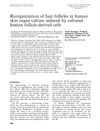TLDR Sex hormones and antiandrogens can either stimulate or inhibit human hair follicle cell growth depending on the dose.
In a study from July 1993, researchers investigated the effects of sex hormones and antiandrogens on the growth of human hair follicle cells in vitro. They cultured cells from the anagen hair bulb papillae, dermal fibroblasts, and keratinocytes, and treated them with varying concentrations of testosterone, dihydrotestosterone, cyproterone acetate, and 17 alpha-propylmesterolone. Testosterone and dihydrotestosterone at 345 nM significantly reduced the proliferation of papilla cells and outer root sheath keratinocytes compared to controls. Low doses of 17 beta-estradiol had no effect, while 180 nM increased growth velocities of all cell types, particularly papilla cells. Low doses of cyproterone acetate and 17 alpha-propylmesterolone enhanced growth, but high doses inhibited it. The presence of androgens neutralized the growth-stimulating effect of antiandrogens. The study concluded that hair follicle cell growth varies with hormone concentrations, and papilla cells and outer root sheath keratinocytes are particularly sensitive to these hormones, supporting the idea of their distinct androgen sensitivity.
9 citations
,
October 1991 in “Archives of Dermatological Research” Testosterone, DHT, and estradiol significantly affect hair cell growth.
22 citations
,
July 1990 in “Acta Dermato Venereologica” High levels of testosterone and dihydrotestosterone inhibit hair cell growth, while high levels of estradiol promote it.
28 citations
,
April 1988 in “Archives of Dermatological Research” 25 citations
,
January 1988 in “Journal of Investigative Dermatology” 103 citations
,
December 1986 in “Journal of Investigative Dermatology”  53 citations
,
May 1986 in “Clinics in endocrinology and metabolism”
53 citations
,
May 1986 in “Clinics in endocrinology and metabolism” Androgens like testosterone affect hair growth and oil production differently across body parts and individuals.
29 citations
,
May 1986 in “Journal of Steroid Biochemistry” Androgens don't directly affect hair cell growth or protein production.
106 citations
,
April 1986 in “British Journal of Dermatology” Dermal papilla cells from human hair follicles form unique structures and don't live as long as other skin cells in lab conditions.
95 citations
,
July 2006 in “British Journal of Dermatology” Vitamin D receptors in hair follicles change with the hair cycle, affecting hair growth.
 56 citations
,
July 2005 in “Experimental Dermatology”
56 citations
,
July 2005 in “Experimental Dermatology” Injected human hair follicle cells can create new, small hair follicles in skin cultures.
January 2003 in “Chinese Journal of Reparative and Reconstructive Surgery” Dermal papilla cells can help form hair follicles and produce hair.
 61 citations
,
October 1996 in “Development”
61 citations
,
October 1996 in “Development” Hair growth can be stimulated by combining certain skin cells, which can rejuvenate old cells and cause them to specialize in hair follicle creation.
 94 citations
,
February 1994 in “The journal of investigative dermatology/Journal of investigative dermatology”
94 citations
,
February 1994 in “The journal of investigative dermatology/Journal of investigative dermatology” EGF makes hair follicles grow longer but stops hair production.




